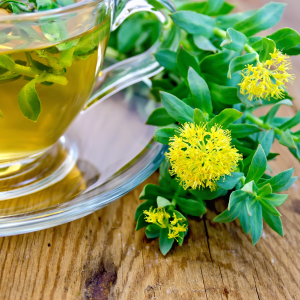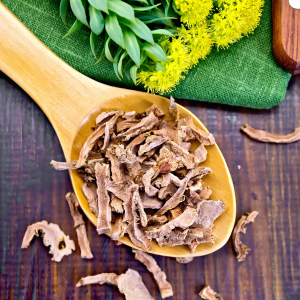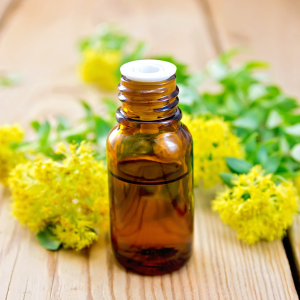Rhodiola Root: A Resilient Herbal Ally for Stress, Immunity, and COVID-19 Support
Introduction to Rhodiola Root (Rhodiola Rosea)
Rhodiola root, also known as Rhodiola rosea, is a resilient herb that thrives in the cold, mountainous regions of Europe and Asia. Revered for centuries in traditional medicine systems, particularly in Russia and Scandinavia, Rhodiola has earned its place as one of the most powerful adaptogens—herbs that help the body resist physical, chemical, and biological stressors. In the context of modern-day health challenges, including the COVID-19 pandemic, Rhodiola’s ability to support the immune system, reduce stress, and enhance overall vitality has garnered increasing attention.
This article explores the history, medicinal properties, and research-backed benefits of Rhodiola root, particularly in relation to stress management, immune support, and its potential role in protecting against viral infections such as COVID-19.
The Traditional and Modern Uses of Rhodiola Root
Rhodiola has a long history of use in traditional medicine, where it was prized for its ability to increase stamina, reduce fatigue, and enhance resilience. It was commonly used by Siberian and Viking warriors to boost physical endurance and mental clarity during long campaigns. Today, Rhodiola is widely recognized in both traditional and modern herbal medicine for its adaptogenic qualities.
 Key Benefits of Rhodiola Root
Key Benefits of Rhodiola Root
-
Adaptogenic Properties: Rhodiola is classified as an adaptogen, a unique class of herbs that help the body adapt to stress. Adaptogens work by regulating the hypothalamic-pituitary-adrenal (HPA) axis, which controls the body's stress response. This makes Rhodiola particularly valuable for those experiencing chronic stress, which can weaken the immune system and make the body more susceptible to infections.
-
Immune System Support: Rhodiola has been shown to enhance immune function by improving the body’s ability to cope with stressors. Chronic stress is known to suppress immune function, and by reducing stress, Rhodiola helps the body maintain a strong and responsive immune system. Additionally, research suggests that Rhodiola can stimulate the production of natural killer cells, a critical component of the immune response to viral infections.
-
Antiviral Properties: While Rhodiola is best known for its adaptogenic effects, research has also highlighted its antiviral potential. Compounds found in Rhodiola, such as rosavin and salidroside, exhibit antiviral activity by inhibiting the replication of viruses and boosting the body's natural defenses. This makes Rhodiola a promising herb in the context of viral infections like COVID-19.
-
Anti-Fatigue and Cognitive Enhancement: One of Rhodiola’s most well-documented benefits is its ability to combat fatigue and enhance mental performance. Studies have shown that Rhodiola can improve concentration, memory, and overall cognitive function, particularly under conditions of stress or fatigue. This is especially relevant for those recovering from illness, as post-viral fatigue is a common concern among COVID-19 survivors.
-
Anti-Inflammatory Effects: Chronic inflammation plays a significant role in many diseases, including viral infections like COVID-19. Rhodiola contains potent anti-inflammatory compounds that can help reduce inflammation throughout the body. By controlling inflammation, Rhodiola may help prevent severe complications associated with viral infections, such as cytokine storms, which are linked to severe COVID-19 cases.
 Scientific Research on Rhodiola Root
Scientific Research on Rhodiola Root
Recent scientific research supports many of the traditional uses of Rhodiola root, particularly its role in reducing stress, boosting immunity, and fighting fatigue. Here’s an overview of key studies:
-
Stress and Fatigue Reduction: Numerous studies have demonstrated Rhodiola’s effectiveness in reducing symptoms of stress and fatigue. In one clinical trial, participants taking Rhodiola reported significant reductions in mental and physical fatigue, along with improvements in mood and cognitive function. This is particularly important during the COVID-19 pandemic, where stress levels are high, and mental health is a critical concern.
-
Immune System Enhancement: Studies on Rhodiola’s effects on the immune system have shown that it can enhance the body’s natural defenses by stimulating immune cells such as T-cells and natural killer cells. This is vital for individuals looking to bolster their immunity during viral outbreaks.
-
Antiviral Research: Preliminary research suggests that Rhodiola’s active compounds may inhibit the replication of viruses, including coronaviruses. While more research is needed to confirm its specific efficacy against COVID-19, these findings indicate that Rhodiola could be a valuable tool in managing viral infections.
-
Cognitive Benefits: A study published in Phytomedicine found that Rhodiola significantly improved cognitive function in individuals experiencing stress-related fatigue. Participants reported enhanced memory, concentration, and mental clarity, which are crucial for maintaining productivity and mental health during prolonged periods of stress.
 Rhodiola Root and COVID-19: How It Can Help
Rhodiola Root and COVID-19: How It Can Help
While Rhodiola is not a cure for COVID-19, its ability to strengthen the immune system, reduce stress, and combat fatigue makes it a valuable herb for supporting overall health during the pandemic. Here are some key ways Rhodiola can be beneficial:
-
Boosting Immune Function: By enhancing the immune response and reducing stress-related immune suppression, Rhodiola can help your body defend against infections, including COVID-19.
-
Supporting Recovery: For those recovering from COVID-19, Rhodiola’s anti-fatigue and cognitive-enhancing properties can help combat post-viral fatigue and brain fog, which are common in long COVID cases.
-
Reducing Inflammation: Rhodiola’s anti-inflammatory effects can help control the inflammation associated with severe COVID-19 symptoms, potentially preventing complications.
How to Use Rhodiola Root
How to Use Rhodiola Root: Dosage, Forms, and Practical Guidance
Rhodiola root, prized for its powerful adaptogenic properties, is available in various forms, each offering unique advantages depending on your needs and lifestyle. Whether you're seeking stress relief, immune support, or recovery from fatigue, understanding how to use Rhodiola root effectively can help you get the most out of this remarkable herb. Below is an expanded guide to its different forms, ideal dosages, and why each option may suit your needs.
 Forms of Rhodiola Root
Forms of Rhodiola Root
-
Capsules and Tablets
- Why Use Them: Capsules and tablets are among the most convenient and standardized forms of Rhodiola root. They are easy to dose accurately, portable, and require no preparation, making them ideal for busy individuals who need a quick and reliable way to take their daily Rhodiola. This form is also preferred by those who want to ensure consistent intake of the active compounds, rosavin and salidroside, which are often standardized in these products.
- Dosage: A typical dosage for capsules or tablets ranges from 200 to 600 mg per day, depending on your specific needs. For general stress reduction and immune support, starting with 200 mg daily may suffice, while those dealing with higher stress levels or recovering from illness might benefit from up to 600 mg daily. It's recommended to split the dose into two servings—one in the morning and one early afternoon—to maintain steady levels throughout the day.
-
Tinctures
- Why Use Them: Tinctures offer a liquid extract of Rhodiola root, typically preserved in alcohol or glycerin. This form is fast-acting because it is absorbed quickly into the bloodstream. Tinctures allow for flexible dosing, making them suitable for those who prefer adjusting their intake based on daily needs. They are also a great option for people who have difficulty swallowing capsules or tablets.
- Dosage: The dosage for tinctures can vary widely depending on the concentration, but a common recommendation is 30 to 60 drops (about 1 to 2 ml) taken 1 to 3 times daily. Tinctures can be added to water, tea, or taken directly under the tongue for quicker absorption.
-
Teas
- Why Use Them: Rhodiola root tea provides a more traditional method of consuming the herb, offering a calming ritual alongside its adaptogenic benefits. Drinking Rhodiola tea may enhance relaxation and be part of a mindful practice to reduce stress. However, it’s important to note that teas may not provide the same concentration of active compounds as standardized extracts, so they may be more suited for mild stress relief and general wellness rather than therapeutic use.
Precautions and Considerations
While Rhodiola is generally considered safe for most people, it is important to use it under the guidance of a healthcare provider, especially if you have pre-existing medical conditions or are taking medication. Pregnant and breastfeeding women should consult their doctor before using Rhodiola. Additionally, because Rhodiola can have stimulating effects, it is best taken earlier in the day to avoid disrupting sleep.
Conclusion: Rhodiola Root as a Resilient Herbal Ally
Rhodiola root (Rhodiola rosea) is a powerful adaptogen with a range of benefits that make it particularly relevant in the context of modern health challenges, including COVID-19. From reducing stress and boosting immunity to enhancing cognitive function and fighting fatigue, Rhodiola offers a natural and effective way to support your body’s resilience during these uncertain times.
As research continues to uncover the full potential of Rhodiola, its role in enhancing overall health and supporting recovery from viral infections, including COVID-19, will likely become even more significant. Whether you are looking for preventative support or seeking to regain strength and vitality after illness, Rhodiola root stands as a trusted herbal ally in the journey toward better health.
References:
https://schw-aerztej.healthbooktimes.org/article/74319-the-potential-role-of-rhodiola-rosea-l-extract-ws-1375-for-patients-with-post-covid-19-fatigue
https://pubmed.ncbi.nlm.nih.gov/35337143/
https://www.researchgate.net/publication/359211420_Efficacy_of_Adaptogens_in_Patients_with_Long_COVID-19_A_Randomized_Quadruple-Blind_Placebo-Controlled_Trial
https://psychnews.psychiatryonline.org/doi/full/10.1176/appi.pn.2021.12.17
https://www.webmd.com/vitamins/ai/ingredientmono-883/rhodiola
https://journals.sagepub.com/doi/abs/10.1177/1934578X221142790

